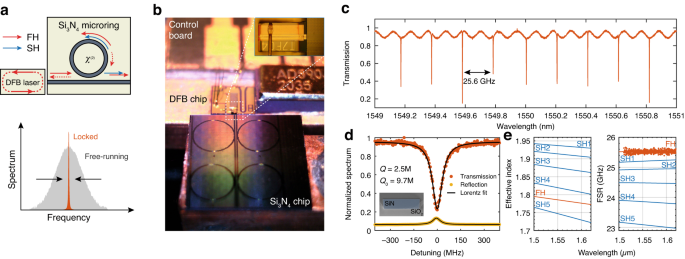2023-12-18 スイス連邦工科大学ローザンヌ校(EPFL)
◆これにより、医療画像処理や原子時計など、新たな用途が開発可能。技術的なギャップを埋め、半導体レーザーの相関性を向上させ、可視光スペクトルにシフトさせることで、未来のデバイス開発に寄与する可能性がある。
<関連情報>
- https://actu.epfl.ch/news/a-micro-ring-resonator-with-big-potential-3/
- https://www.nature.com/articles/s41377-023-01329-6
自己注入ロック全光ポーリングによるチップスケールの第2高調波光源 A chip-scale second-harmonic source via self-injection-locked all-optical poling
Marco Clementi,Edgars Nitiss,Junqiu Liu,Elena Durán-Valdeiglesias,Sofiane Belahsene,Hélène Debrégeas,Tobias J. Kippenberg & Camille-Sophie Brès
Light: Science & Applications Published:08 December 2023
DOI:https://doi.org/10.1038/s41377-023-01329-6

Abstract
Second-harmonic generation allows for coherently bridging distant regions of the optical spectrum, with applications ranging from laser technology to self-referencing of frequency combs. However, accessing the nonlinear response of a medium typically requires high-power bulk sources, specific nonlinear crystals, and complex optical setups, hindering the path toward large-scale integration. Here we address all of these issues by engineering a chip-scale second-harmonic (SH) source based on the frequency doubling of a semiconductor laser self-injection-locked to a silicon nitride microresonator. The injection-locking mechanism, combined with a high-Q microresonator, results in an ultra-narrow intrinsic linewidth at the fundamental harmonic frequency as small as 41 Hz. Owing to the extreme resonant field enhancement, quasi-phase-matched second-order nonlinearity is photoinduced through the coherent photogalvanic effect and the high coherence is mapped on the generated SH field. We show how such optical poling technique can be engineered to provide efficient SH generation across the whole C and L telecom bands, in a reconfigurable fashion, overcoming the need for poling electrodes. Our device operates with milliwatt-level pumping and outputs SH power exceeding 2 mW, for an efficiency as high as 280%/W under electrical driving. Our findings suggest that standalone, highly-coherent, and efficient SH sources can be integrated in current silicon nitride photonics, unlocking the potential of χ(2) processes in the next generation of integrated photonic devices.



